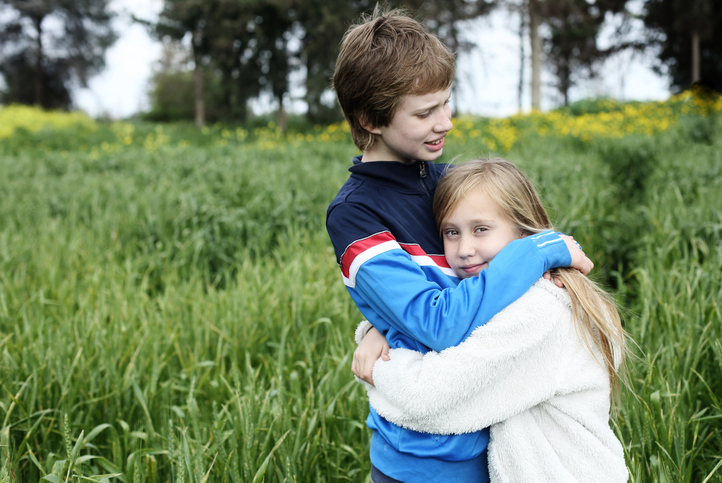Keep a list of ideas on the fridge and whenever they get bored you can suggest one from the list.
Helping siblings have a positive relationship
Positive sibling relationships need to be worked on in all families, whether or not there is a disabled child in the family. Tackling issues of fairness and showing siblings how to interact and play together help siblings develop more positive relationships.

Deal with the fairness issue
Issues around fairness arise in all families where there is more than one child. Children don’t really want to share parental time and attention with someone else. When they complain about fairness they often get an emotional response from a parent and this in itself increases the amount of attention they get. This tends to happen a lot in families of disabled children as the siblings usually do get or feel they get less parental attention. Responding well to to siblings’ complaints about fairness helps improve siblings’ relationships with each other.
Responding to ‘It’s not fair’
Respond calmly
Respond to complaints about fairness in a relaxed calm manner – your annoyance or worry about it is more likely to increase the complaints. Some siblings may find that if they say things are not fair, then their parent who may be feeling guilty will give them more gifts or rewards to compensate for this; this will be unhelpful in the longer term and the sibling will feel bought off.
Listen to the feeling
Listen to the feeling behind the complaint and respond by acknowledging that and asking him/her to tell you more about it. For example – ‘It must be difficult when things seem unfair; I know that I would find that hard too. What things do you find especially hard?’ Some siblings will just need this validation of their feelings and nothing more.
Fair or equal?
Talk about the difference between things being fair and things being equal– if things had to be equal that would mean that all the children went to bed at the same time; would wear the same clothes… Talk about how you want each child to have their own unique needs met. When a child says that something is not fair, it tends to be a request for something more – does he or she want a cuddle, some help with homework, a chance to talk about worries about friends or school? Ask your child about his/her needs and together come up with some ideas for meeting these. Knowing that you really care about these will confirm your child’s self worth.
Fairness with gifts and your time
When it comes to birthday presents and other gifts, some families let the children know that X amount of money is available for each child. Different things will be bought to suit each child’s needs but the same amount of money will be spent. Ask relatives to be fair with gifts for both children.
Take a good look at how much attention your sibling child actually gets. Your sibling child may receive very little time and attention from you and this may be causing problems. Each day spend some time with a sibling doing something that they really enjoy doing with you. Ask other people to support you so that you can spend a larger chunk of time with a sibling.
Don't do these
Don’t say ‘Life is not fair’, as your child is not old enough to understand what you mean by this and he or she will feel dismissed.
Don’t keep a log of who got what and when. This makes fairness into a huge parental pressure. Just ask your child ‘ OK, what can I do to help you right now?’ or ‘Lets spend some time this evening talking about what we can do together to makes things as fair as possible for you’
Teach siblings how to interact together
Things we recommend are:
- Having a set time of day which is for playing together and making it clear when it is time for your sibling child to have time to be on their own. Some families make a picture timetable for the fridge of what will happen during the day.
- Teaching siblings ways that their brother or sister can join in a game to their best ability – siblings are often very imaginative about coming up with ideas for this – keep a list of activities that work well.
- Teaching your disabled child ways to play or take part in a game or activity. If your son or daughter has a short attention span or finds it hard to follow rules, show siblings how to do a very short game together.
- Showing your children ways to communicate that they want to do something with the other child – using words or signs or pictures
- Helping your children learn to recognize whether another child is enjoying or not liking an activity – through identifying facial expressions, sounds, or gestures.
- Noticing when they do play or interact well together and reward that behaviour through an affectionate hug, or a positive statement “That looks like fun”, or through joining in with them.
Ideas for games together
Music stuff
- Listen to music
- Singing
- Clapping songs
- Dance to the music then run/wheel to the mat when the music stops
- Karaoke
Story stuff
- Listen to an audio story together
- Put some household things in a bag and make a story from these props
- Parent reads story aloud and children make funny faces for the characters or act out the story
Throwing stuff
- Ball games
- Throwing the bean bag into a bucket
- Play with balloons – draw faces on them and then play throw and catch
- Make newspaper snowballs and throw them at each other
Style stuff
- Hairstyling and makeup
- Painting nails
- Collecting fashion pictures from magazines